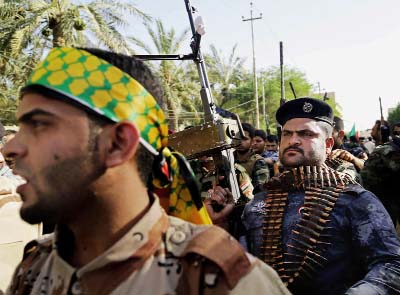
AP, Baghdad :
Abu Murtada al-Moussawi answered the call last summer from Iraq’s top Shiite cleric to help save the country from the Islamic State group, but after less than three months on the front lines he and several friends returned home because they had run out of food.
“Sometimes, we didn’t have enough money to buy mobile scratch cards to call our families,” al-Moussawi, a Shiite from the southern city of Basra, said. “Everybody felt like we were being forgotten by the government.”
Now Iraq’s Shiite religious establishment is urging the faithful to donate food, money and supplies. The clerics hope to prevent a repeat of last summer’s collapse of Iraq’s demoralized army in the face of the Islamic State group’s lightning advance, which saw the extremists capture the country’s second largest city Mosul and sweep south toward the capital.
Shortly after the June blitz across northern Iraq, tens of thousands of Shiite men answered a nationwide call-to-arms by the top Shiite cleric, Grand Ayatollah Ali al-Sistani. Many volunteers came from the country’s most impoverished areas and were barely able to make ends meet even before taking up arms.
The Shiite fighters are credited with helping to stall the militants’ advance outside Baghdad, breaking the siege of the northern Shiite-majority town of Amirli in August, and later driving the militants out of Jurf al-Sakher south of the capital.
Al-Moussawi was deployed along with fellow militiamen in Latifiyah, a town 30 kilometers (20 miles) south of Baghdad, with orders to keep the Islamic State group out of Sunni areas along the so-called Baghdad Belt. But over the past two months, the number of men in al-Moussawi’s unit has dwindled, with as many as 1,000 deserting over economic hardship, he said.
Abu Murtada al-Moussawi answered the call last summer from Iraq’s top Shiite cleric to help save the country from the Islamic State group, but after less than three months on the front lines he and several friends returned home because they had run out of food.
“Sometimes, we didn’t have enough money to buy mobile scratch cards to call our families,” al-Moussawi, a Shiite from the southern city of Basra, said. “Everybody felt like we were being forgotten by the government.”
Now Iraq’s Shiite religious establishment is urging the faithful to donate food, money and supplies. The clerics hope to prevent a repeat of last summer’s collapse of Iraq’s demoralized army in the face of the Islamic State group’s lightning advance, which saw the extremists capture the country’s second largest city Mosul and sweep south toward the capital.
Shortly after the June blitz across northern Iraq, tens of thousands of Shiite men answered a nationwide call-to-arms by the top Shiite cleric, Grand Ayatollah Ali al-Sistani. Many volunteers came from the country’s most impoverished areas and were barely able to make ends meet even before taking up arms.
The Shiite fighters are credited with helping to stall the militants’ advance outside Baghdad, breaking the siege of the northern Shiite-majority town of Amirli in August, and later driving the militants out of Jurf al-Sakher south of the capital.
Al-Moussawi was deployed along with fellow militiamen in Latifiyah, a town 30 kilometers (20 miles) south of Baghdad, with orders to keep the Islamic State group out of Sunni areas along the so-called Baghdad Belt. But over the past two months, the number of men in al-Moussawi’s unit has dwindled, with as many as 1,000 deserting over economic hardship, he said.

